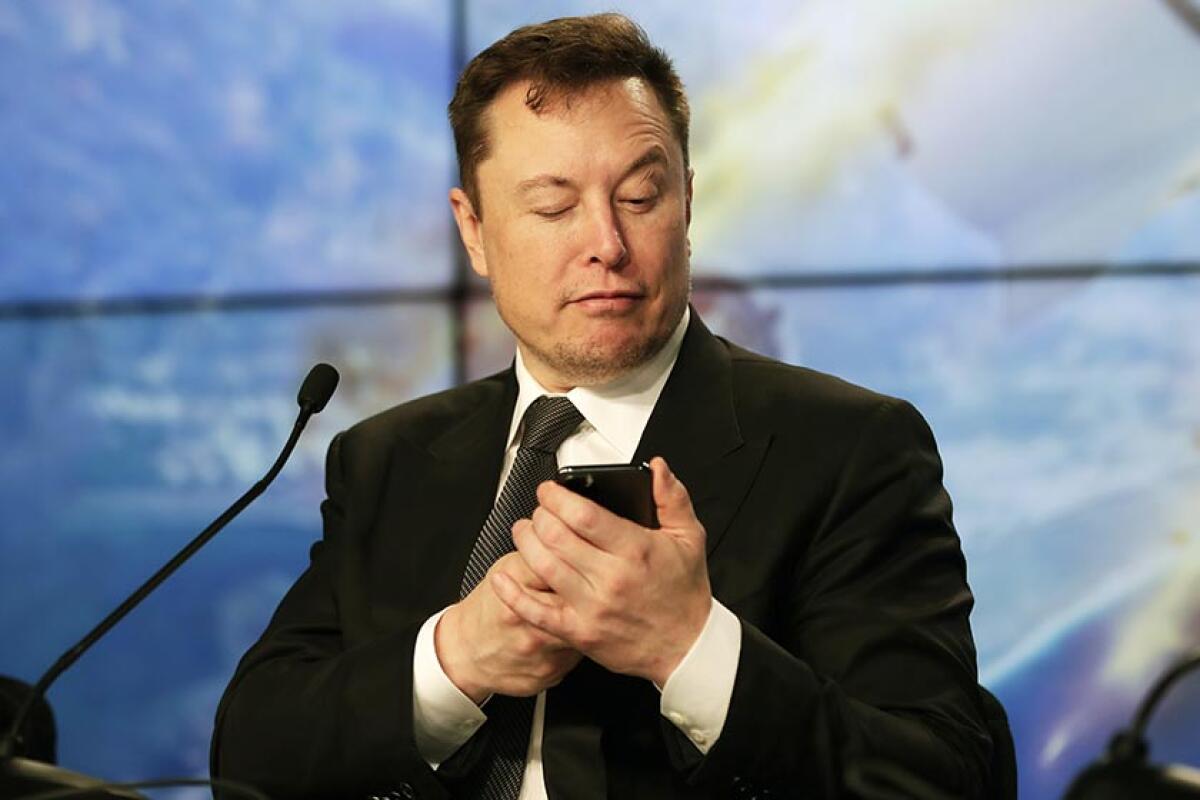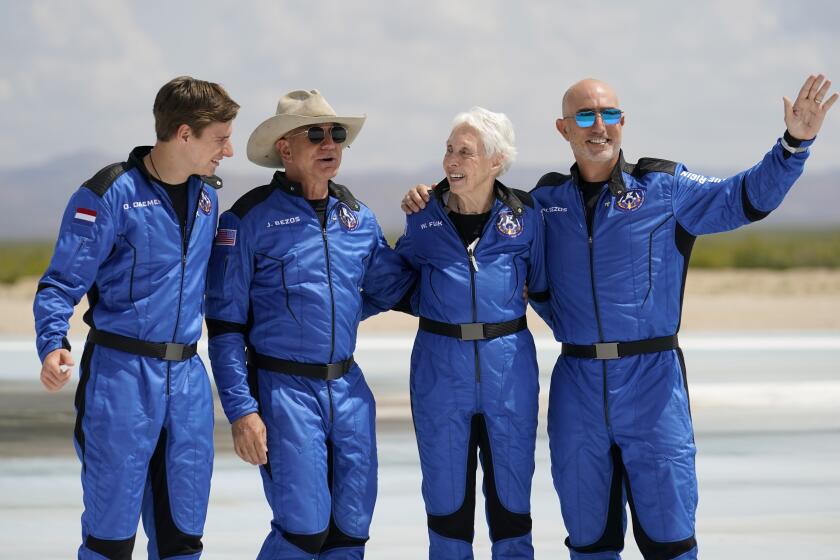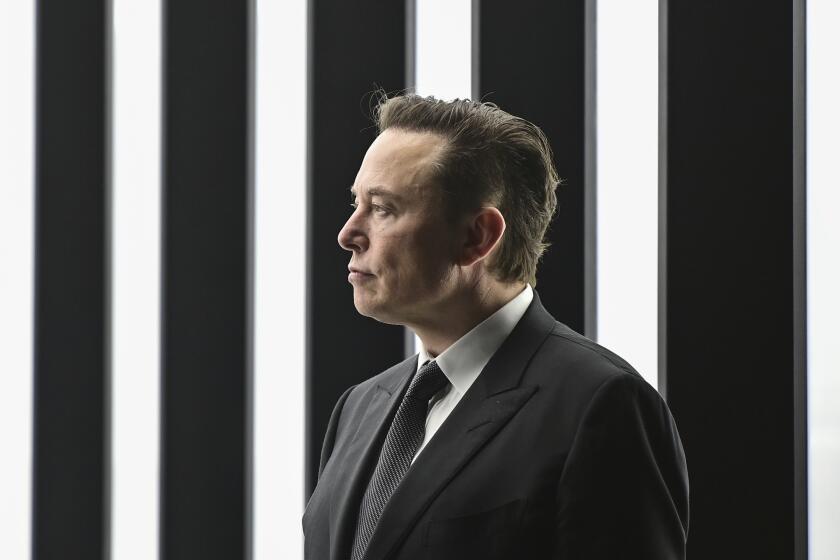Column: Is this my last post about Elon Musk, Twitter boss?

- Share via
Back in the prehistoric era (2016), a small group of Times reporters and editors, including myself, met with Elon Musk at SpaceX headquarters in Hawthorne.
Musk mostly talked about his idea of transporting humanity to Mars as an escape route from our global-warming-beleaguered home planet. This was his big hobby horse at that time. He was low-key and ruminative, almost convincing.
It was plain that he had thought a lot, and caringly, about the issue. He handed out coffee mugs inscribed “Occupy Mars.” People took him seriously.
As the saying goes, be careful what you wish, as you might get it.
— Elon Musk admonishes Twitter users who voted for him to step down as CEO
Flash forward six years. The Elon Musk of today seems to be angling for the trophy of World’s Biggest Jackanapes. (Choose either of the following Merriam-Webster definitions: “an impudent or conceited fellow,” or “a saucy or mischievous child.”)
We quite properly try to avoid psychoanalyzing prominent newsmakers. But Musk’s role as owner and chief executive of Twitter seems to have a profound effect on his public behavior, and even on his patience.
Get the latest from Michael Hiltzik
Commentary on economics and more from a Pulitzer Prize winner.
You may occasionally receive promotional content from the Los Angeles Times.
On Sunday he posted one of his informal Twitter polls, asking users whether he should step down as head of Twitter and pledging, “I will abide by the results of this poll.”
When the poll closed, the 17.5 million respondents voted “yes,” 57.5% to 42.5%. As of this writing, he hasn’t followed through on his promise, but an hour after the poll opened, he tweeted: “As the saying goes, be careful what you wish, as you might get it.”
He also noted that there is no post-Elon succession plan, and implied that whoever took the job must be a masochist, which would come as no surprise to anyone.
Musk has often employed user polls to validate decisions he has already made. In November 2021, he asked Twitter followers to vote on whether he should sell 10% of his shares in the electric vehicle maker Tesla, the core of his personal wealth.
He promised to abide by the results, in which respondents favored the sale by about 58% to 42%. As it happens, however, he had filed disclosures prior to the poll indicating that he had already committed to selling a sizable chunk of Tesla shares.
Musk posted his resignation poll after a tough week in which he suspended a number of prominent journalists and commentators from Twitter, asserting inaccurately that they had posted real-time information about his personal whereabouts that he said could facilitate stalkers. He reinstated the accounts after running a poll that encouraged him to do so.
He then issued a ukase banning tweets promoting several rival social media platforms, including Facebook, Instagram and Mastodon — the latter an increasingly popular refuge for Twitter users repelled by Musk’s management.
Elon Musk and his fellow billionaires are demanding absolute privacy, but given their power over the economy, they deserve an even brighter spotlight.
Within a few hours, the tweet and a Twitter page announcing the policy were deleted, possibly because of the chance that the policy would breach European Union regulations for social media firms.
Musk’s suggestion that he may step away from Twitter may have been prompted by the apparent effect of his adventure with the social media firm on Tesla shares.
Since Musk acquired Twitter on Oct. 27, Tesla has suffered a market beating, with shares down by nearly 33%. That’s part of a longer slide from the company’s stature as a high-tech darling. Tesla peaked above $381 per share in November 2021, when it was one of the most valuable companies in the world, with a market capitalization of about $1.2 trillion.
Tesla shares have fallen 60% since then, and 57% this year alone. Its market capitalization Monday hovered around $477 billion.

The shares closed down 0.2% on Monday, but in midday trading Monday they were rising modestly, perhaps on investors’ relief that by stepping down as Twitter’s CEO, Musk might turn his attention back to Tesla.
That would be important because Tesla faces head winds it hasn’t needed to confront for several years, notably increased competition in the electric vehicle space from legacy automakers such as Ford, General Motors, BMW and Audi. They’re marching into a space that Tesla long had almost entirely to itself.
Tesla sales have apparently been slowing in recent weeks, possibly because of buyer concerns about the economy.
But commentary abounds on Twitter from Tesla owners and prospective buyers saying they would avoid the product in the future out of distaste for Musk’s outspoken swing to the political far right, as reflected in many of his recent tweets and policies.
Musk’s public standing may be following the trajectory of Donald Trump, another once-lionized icon who is now facing increased skepticism, even ridicule, from his onetime followers — and whose tolerance for having his whims thwarted is extremely limited.
The deterioration of Musk’s public image can be traced online, where he has become the subject of internet memes that treat him anything but politely.
One is the scene from the German film “Downfall,” about Hitler’s last days in the bunker, that has been re-subtitled hundreds, even thousands, of times to show Hitler erupting in fury about Trump’s losing the 2020 election, the Dallas Cowboys losing to Green Bay, even the “Downfall” parodies themselves.
Elon Musk is doing his best to drive reasonable Twitter users away by promoting false accusations against Fauci and anti-LGBTQ conspiracy-mongering.
In the latest iteration Hitler — er, Musk — goes ballistic over the deterioration of respect for Twitter since his Oct. 27 takeover of the platform, especially after his acolytes inform him that the poll he posted about resigning as Twitter CEO “has not gone your way.”
He rants, “All my old supporters are turning on me, and the only ones who still like me are MAGA losers, and Russians...” (Warning: Not entirely safe for work.)
Another meme, posted Sunday on Twitter itself, is captioned “nfl version of elons twitter deal.”
It’s a clip from the final comic-opera play of Sunday’s game between the New England Patriots and Las Vegas Raiders, in which Patriots running back Rhamondre Stevenson tries to evade a tackle that would end regulation time with a tie by throwing a lateral to teammate Jakobi Meyers, who laterals again — into the hands of the Raiders’ Chandler Jones, who runs the gift into the end zone for a win.
Whether Musk’s stepping down as Twitter CEO could help arrest the platform’s abandonment by users who once depended on it for curated debate is unknown. After all, he’s not talking about selling Twitter or placing it in some sort of trust, insulating it from his personal eccentricities — not yet.
The platform’s finances are under pressure from looming debt payments and the flight of blue-chip advertisers. That could prompt Musk either to turn Twitter over to more professional management or lead him toward even more capricious policymaking in search of revenue.
Back in 2016, interviewing Musk was interesting and illuminating, even if his musings about colonizing Mars were loopy in their way. Today, following Musk is like being submerged in the right-wing id.
Still, Musk’s CEO poll and his promise to abide by the result suggests that Twitter is on the verge of entering a new chapter. If it’s a chapter without a mention of Elon Musk, that will come as a relief to many of its users and perhaps his own investors.
And also to this columnist, who has been an unwilling spectator at this misadventure yet one compelled to write about almost every twist and turn.
I have better things to write about, believe me. I just ... can’t ... resist ... looking. ...
More to Read
Get the latest from Michael Hiltzik
Commentary on economics and more from a Pulitzer Prize winner.
You may occasionally receive promotional content from the Los Angeles Times.













